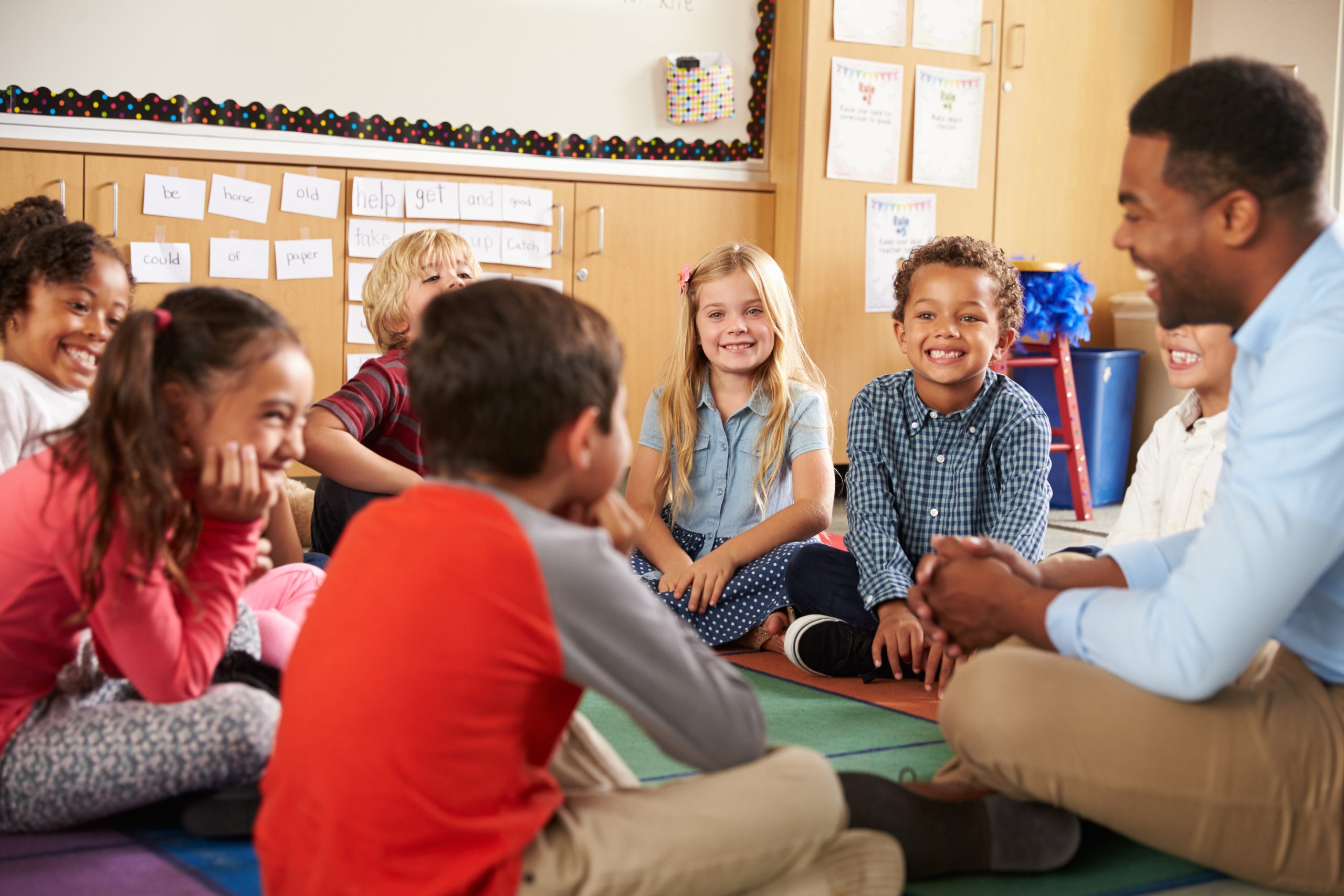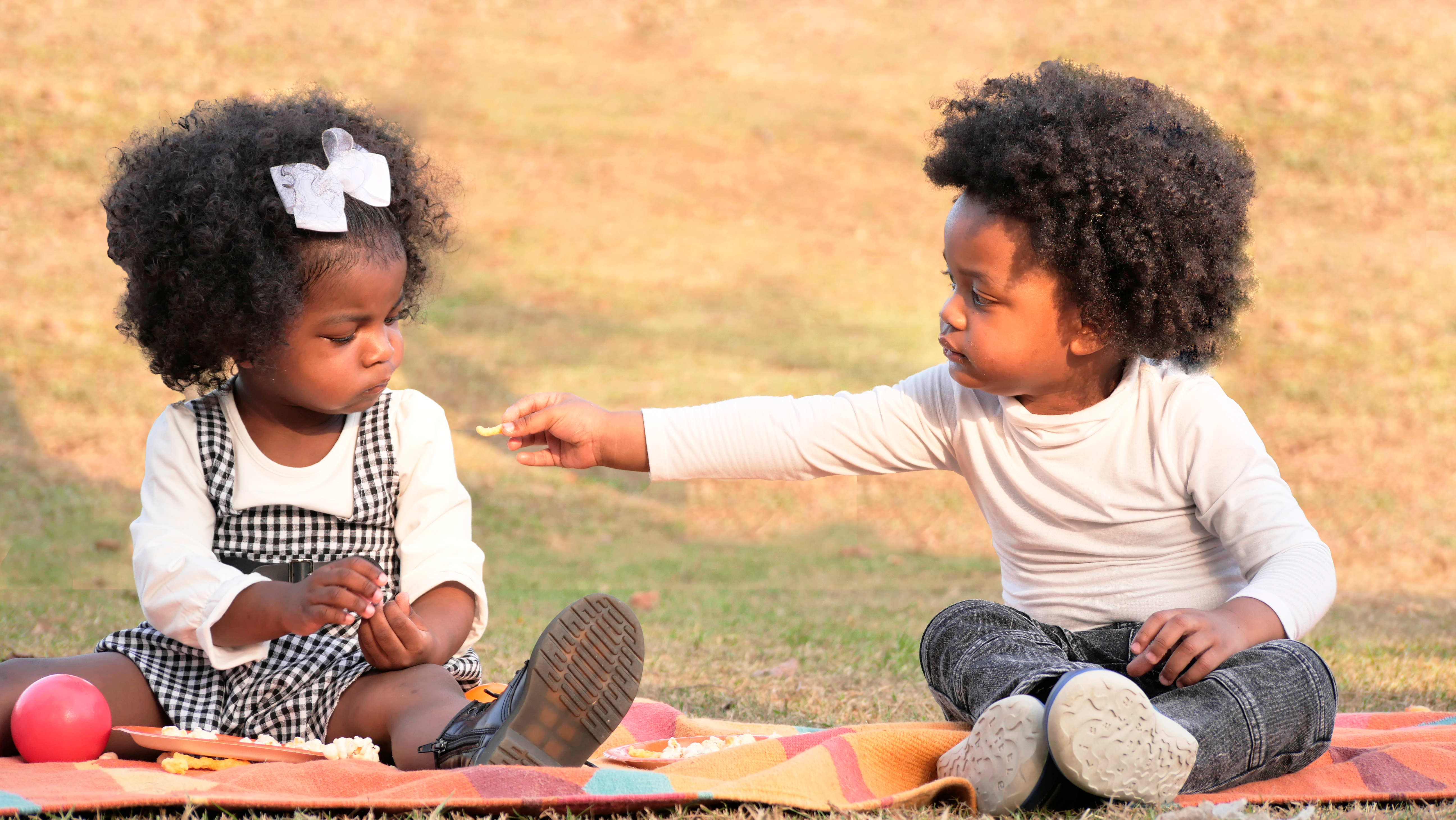Decentring is a key part of child development. It’s what allows individuals to move away from a self-centric perspective, gradually recognising and understanding the viewpoints, emotions, and beliefs of others. Moving from an egocentric perspective to a more allocentric one like this is a huge milestone and is what equips someone to interact well with others.
If you’ve ever met a toddler, you’ll probably know how self-focused their behaviour is. You’ll probably also know that this isn’t an indication that they’ll become a selfish adult—it’s normal!
To understand how decentring happens, we can take a look at the theory it’s based on. Jean Piaget, a pioneer in child psychology, postulated that children navigate through specific stages of cognitive development. One of these stages, the preoperational stage (ages 2-7), sees children grapple with their innate egocentrism and slowly make moves towards decentring. This particular step in the cognitive development journey carries profound implications in everyday scenarios. It will change how children negotiate, how they share toys, and how they empathise with a peer's disappointment over a lost game. This is the foundation of an ability to build relationships, of compassion, and of a harmonious coexistence with others.
Decentring Milestones in Childhood
Decentring happens over a period of time. While each individual is different, the progression generally follows a pattern with specific milestones. Understanding these milestones not only helps educators and parents to foster a supportive environment but also to set realistic expectations. Encouraging activities that naturally involve recognising other perspectives can help learners to develop empathy and collaboration skills.
Infancy (0-2 Years)
- Characteristic
At this age, babies perceive the world primarily around their immediate needs and desires. They are still in an allocentric stage of development.
- Real-world example
An infant will likely cry if you take away their toy. This is because they can only understand that they don’t have it any longer—not why another child might want to play with it.
Early Childhood (2-4 Years)
- Characteristic:
Children begin to recognise that others have feelings but still largely project the ones that they experience onto others.
- Real-world example
A child might offer their teddy bear to a crying friend, assuming what comforts them will comfort others.
Preoperational Stage (4-7 Years)
- Characteristic
Children understand that others have different thoughts and feelings but struggle to understand conflicting viewpoints.
- Real-world example
If a child believes that thunder is caused by clouds banging together, they might find it hard to comprehend someone else’s explanation that it’s caused by atmospheric disturbances.
Concrete Operational Stage (7-11 Years)
- Characteristic
Children now grasp the concept of other people having different and varied perspectives, even if they disagree with them.
- Real-world example
In a disagreement over game rules, a child might say, "I see how you want to play, but I learned it this way."
Early Adolescence (12-15 Years)
- Characteristic
The ability to understand abstract thoughts and multiple perspectives deepens. Children can now grasp broader societal perspectives.
- Real-world example
Discussing a news event, a teenager might say, "I can see why some people feel that way, but my community’s perspective is different."
Decentring in Early Education
While some cognitive milestones equip little ones for their academic future, decentring is the beginning of other abilities which are equally—if not more—important. It shapes children's interactions, collaboration, and emotional intelligence, forming a foundation for relationships and social skills.
Promoting Empathy and Understanding in Classroom Settings
Understanding peers' feelings, thoughts, and perspectives is the biggest part of cultivating empathy. When children can step outside their own viewpoint to consider someone else's, they engage better with their peers and learn to be more inclusive. Here’s an example: a child understands that their classmate feels sad about moving houses and can empathise with the uncertainty and fear of the unknown. They are more inclined to offer comfort or share their stories to help their classmates feel less alone. A friendship may form!
Enhancing Collaborative Learning Experiences and Group Interactions
Collaborative learning is important in today’s pedagogy and classrooms, and decentring skills enable children to better navigate group activities. Recognising other people’s perspectives allows them to understand where team members are coming from and properly consider different opinions. This mutual respect creates a harmonious and more effective group dynamic. Take, for example, a group project assignment. During such projects, children with developed decentring skills might say, "I see why you think that's a good idea, and I think if we combine it with this approach, we could achieve a better outcome." It's clear that decentring in childhood is massively useful to the learning journey as students progress throughout all levels of schooling and beyond. For educators, the mission extends beyond academics; it's about moulding young minds to be considerate, empathetic, and ready to collaborate in an increasingly interconnected world.

Challenges Faced in Decentring
Just like most developmental processes, decentring seldom follows a fully linear progression. There are challenges, and understanding these helps educators foster an environment that nurtures this pivotal skill.
Individual Differences in Development
Every child is unique, and the rate at which they develop cognitive skills will always vary. Some might naturally gravitate towards understanding others from an early age, while others take a bit longer. There's a spectrum of normal development, and caregivers and educators should recognise and respect these individual timelines. For example, while Sarah might be adept at understanding her friend's feelings at age five, Tom may develop this skill more intensively at age seven. Both are on their individual paths, and neither is 'behind'.
Factors that Might Slow the Decentring Process
These external and internal factors can influence decentring:
- Environment
Children brought up in environments where empathy and understanding aren't modelled might find it more challenging to develop these skills. When individual perspectives aren't valued in their surroundings, children can inadvertently suppress the natural inclination to decentre themselves.
- Specific Learning Challenges
Some children with conditions such as Autism Spectrum Disorder (ASD) might find it more challenging to understand others' viewpoints intuitively. They may require tailored strategies to develop these skills. A child with ASD or similar can still develop a good understanding of others, although their journey might look different. Helping children through the decentring process is best done with sensitivity, understanding, and a recognition of the myriad factors that can influence the journey. Knowledge is power, and it allows educators to be more strategic in their approach, tailoring interventions and support to meet each child's unique needs.
Strategies for Educators and Parents: Fostering Decentring in Childhood
We’ve established that although decentring is a natural part of cognitive development, it can be influenced or delayed by other factors. Parents and educators can encourage and guide children on their way to understanding other people’s perspectives.
- Role-playing
Children love to pretend. Setting up role-playing activities where they have to step into another's shoes can nurture understanding of varied perspectives.
- Story discussions
After reading a story, engage children in discussions about how various characters might be feeling or what they might be thinking. This not only boosts comprehension but actively engages them in decentring.
- Encourage active listening
During discussions, encourage children to listen actively. Prompt them with questions like, "What do you think Sarah meant by that?" or "How do you think Tom felt when that happened?"
- Diverse media exposure
Exposing children to books, movies, or shows featuring characters from different backgrounds and cultures broadens their understanding of different worldviews.
The Broader Impacts of Successful Decentring in Childhood
Decenting carries implications far beyond the classroom. In an increasingly globalised world, the ability to connect with and understand people who are different is both beneficial and essential—it’s a necessary life skill!
Conflict Resolution and Interpersonal Relationships
Children with well-developed decentring skills are often better equipped to understand others' feelings, leading to healthier interpersonal relationships. They can anticipate how their actions might affect peers, allowing them to modulate their behaviour and reduce conflicts. Additionally, their capacity to see multiple viewpoints makes them good at mediating and finding solutions when disagreements come about.
Preparation for Multicultural and Diverse Environments
Understanding and appreciating various cultures is hugely important as our world becomes more interconnected. Children good at decentring can navigate diverse environments and recognise the value of different perspectives; they are better prepared for multicultural classrooms, plus an increasingly global workforce and society. By instilling these capabilities early on, we are shaping academically competent, socially adept, and emotionally intelligent individuals.

In Summary
Decentring is the foundation of successful relationships and interactions throughout childhood and adulthood! As children begin to perceive and interpret the world from perspectives other than their own, they gain tools to navigate social dynamics, conflicts, and diverse environments. Being able to get along with and understand others is such a crucial life skill; parents and educators should recognise and nurture this ability from the early stages. For more in-depth learning about decentring, cognitive development, and a range of other topics relevant to UK teachers, take a look at our range of CPD courses.
Recommended Reading & Resources
- Mind in Society: The Development of Higher Psychological Processes by L.S. Vygotsky - Foundations of cognitive development, emphasising social interaction.
- The Psychology of the Child by Jean Piaget - Exploring the developmental stages and their implications.
- Childhood and Society by Erik H. Erikson - An overview of psychosocial stages in child development.
- The Whole-Brain Child by Daniel J. Siegel and Tina Payne Bryson - Strategies to nurture your child's developing mind.
- How Children Think and Learn by David Wood - Insights into the processes underpinning child cognition and learning.

